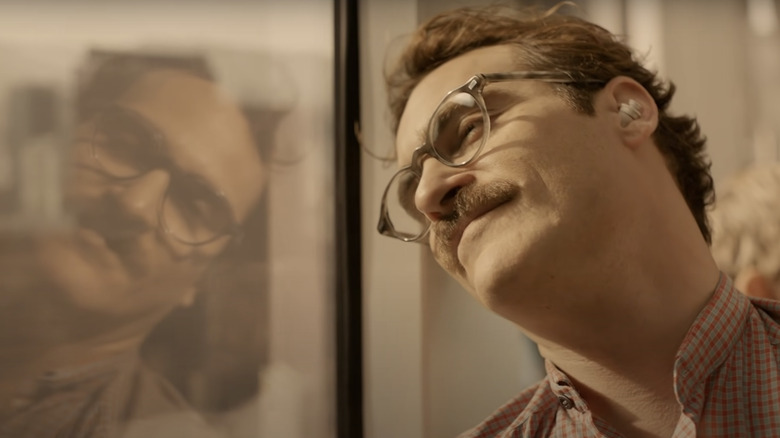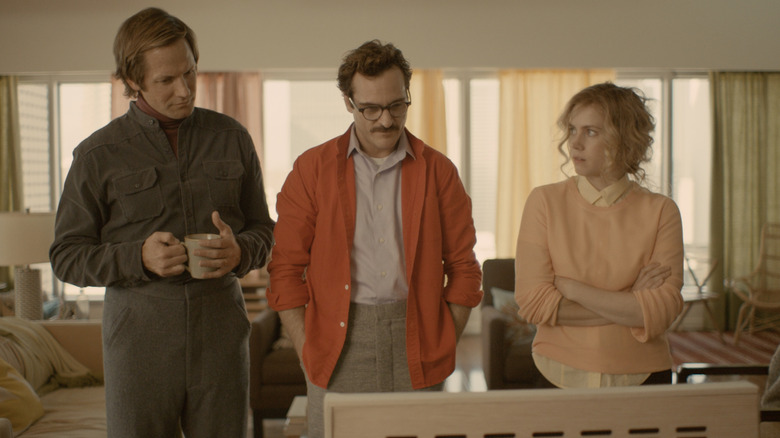Steven Soderbergh Played An Interesting Role In Her's Post-Production
When a lot of artists are knee-deep in the creation of their latest work, they can get a little lost in the weeds of what they are making. A filmmaker has been living with the material for years, which can often make them lose sight of the overall picture they are making. Parts of the story, the tone, or the motivations just seem inherent to a director because they have believed in these things for so long, and their bias of already knowing everything may cloud their judgment on whether or not they are conveying the story effectively. Bringing in another fresh set of eyes could be an en extremely beneficial move when any artist hits that wall of not knowing if a film is working.
This was the case with Spike Jonze while making his fourth and most recent fiction feature, "Her." This was the first of his films borne entirely out of Jonze's own brain. He was not interpreting a Charlie Kaufman screenplay and not adapting a beloved children's book with a co-writer in Dave Eggers. No, "Her" was Jonze by himself developing this beautiful futuristic love story between a man (Joaquin Phoenix) and an operating system (Scarlett Johansson). When you produce a vision of something from yourself totally from scratch, you probably should have trusted people in your life who you feel comfortable turning to for help expressing that vision. Spike Jonze has been lucky to work with and become friends with loads of talented creative people over the course of his career. For "Her," he turned to one of the greatest filmmakers of the last three decades for input.
Take it to Mary Ann Bernard, aka Steven Soderbergh
While many of us know Steven Soderbergh to be one of the modern masters of filmmaking, you may not know that he also acts as the cinematographer and editor for most of his films as well. You may not realize this because he takes on the monikers of Peter Andrews and Mary Ann Bernard in the credits for these roles, respectively. In speaking with Vulture during the release of "Her," Spike Jonze revealed that he turned to Soderbergh to cut his own version of the film:
"He's the smartest, fastest editor-filmmaker I know ... He got the movie on a Thursday, and in 24 hours, he took it from two and a half hours to 90 minutes. We basically said, 'Be radical, shock us,' and it was awesome. He said, 'I'm not saying this should be the cut of the movie, but these are things to think about.' It was amazingly generous of him, and it gave us the confidence to lose some big things that I wasn't ready to lose [before]. Even though we didn't use that exact cut ... we were able to make connections between scenes out of connections he made. And making many of the cuts he suggested was a really good kind of pain."
First off, delivering a cut of a movie in 24 hours is absolutely bananas. Soderbergh has a reputation for working extremely fast, especially since his move over to digital filmmaking, but that is such a short amount of time. Secondly, what an absolutely cool guy to actually immediately start working on the project. No, "I'll get to it on Monday," or anything like that. Just sat down and got it done. That just goes to show you how invested Steven Soderbergh is in the art of filmmaking. He was also perhaps in the midst of post production on his own films "Side Effects" and "Behind the Candelabra," both released the same year as "Her," while doing this. That's a good friend.
In a moment where art reflects life, Amy Adams' character in "Her" is a documentary filmmaker, and she nervously shows Joaquin Phoenix and Matt Letscher's characters some footage from her new film for feedback, saying things like, "So, this is like so unformed. Probably not even worth watching." It shows how vulnerable it is to let someone else into your own little artistic world, but it can be immensely valuable if you have that courage and push through. Having those extra pair of eyes be Steven Soderbergh's maybe makes that leap of faith a little less scary though.

